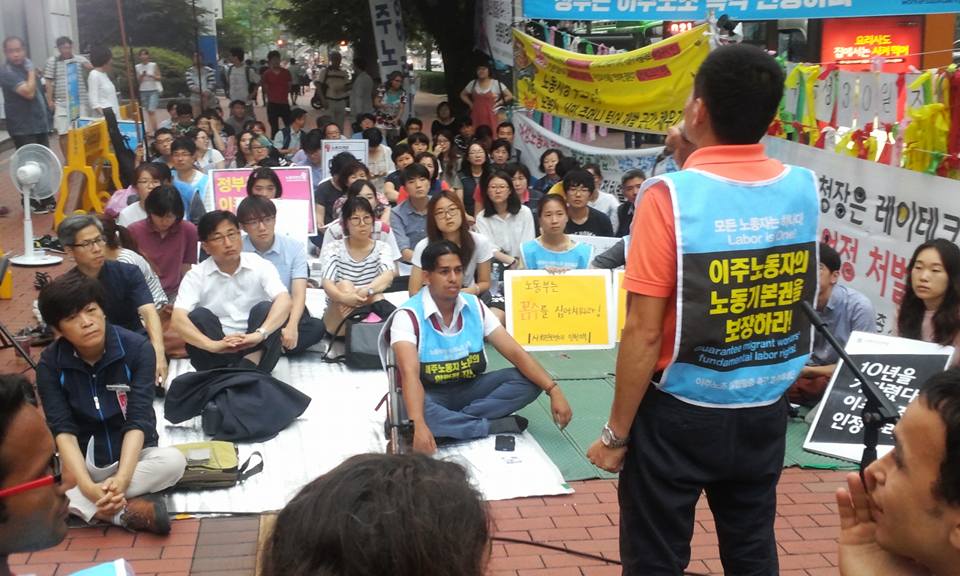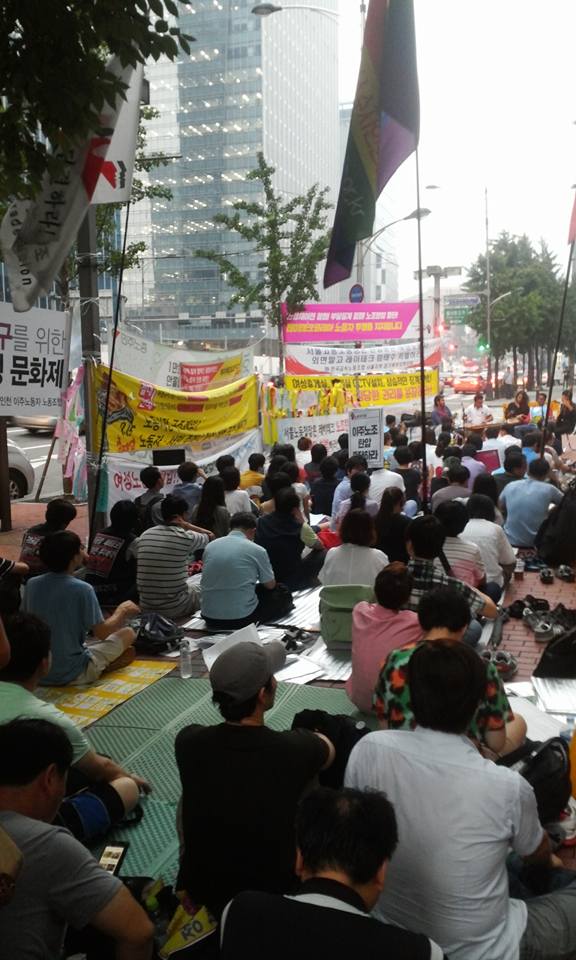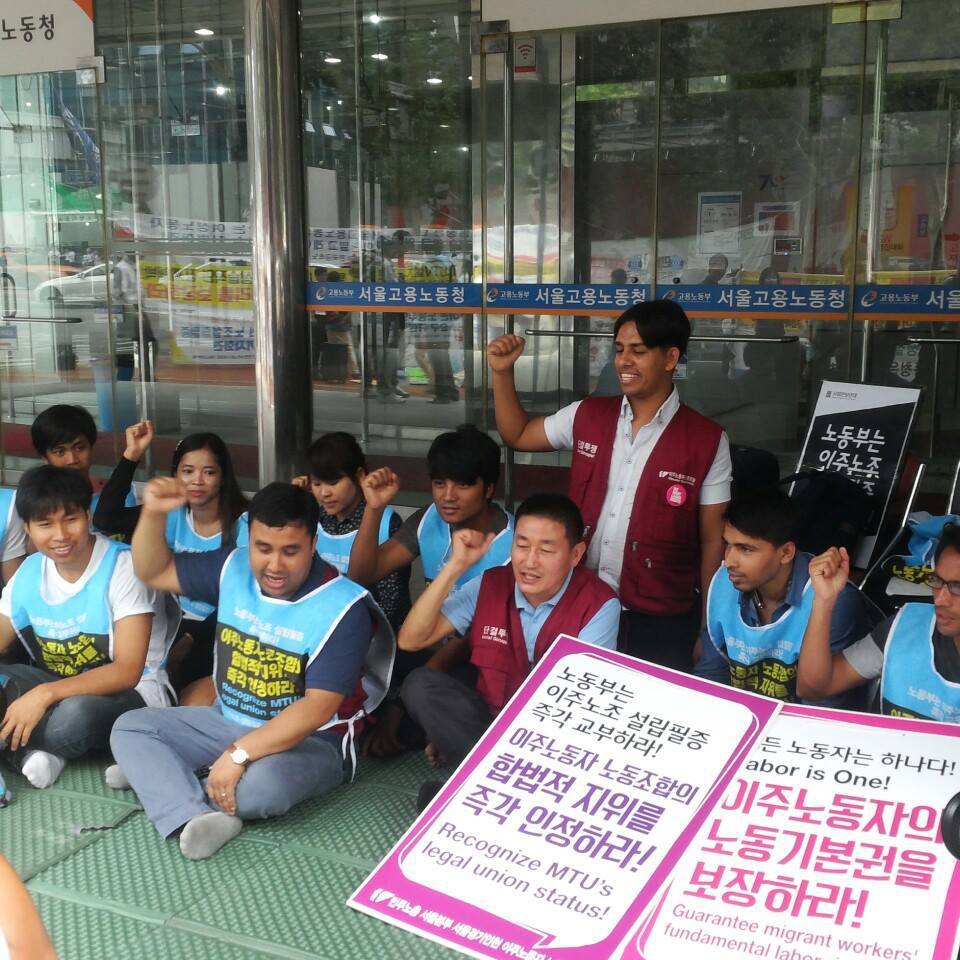Photo: MTU facebook page
Beginning on July 27 and continuing to this day, members and supporters of the Migrants’ Trade Union (MTU) have been holding a sit-in occupation at the Seoul Regional Ministry of Labor in South Korea. The sit-in began in protest of the local government’s refusal to issue legal recognition of the MTU, one month after the June 25 Supreme Court ruling affirming unionization rights for all migrants regardless of status: “Illegal immigrant workers have the right to form and join trade unions, as they are classified as workers.” This court ruling took 8 years, during which time the MTU, its elected officers, and the migrant workers’ population at large have faced constant intimidation, arrest and deportation by the state. The MTU was established in 2005 by migrant workers who held a 381-day occupation to denounce the government’s brutal crackdowns. It was formed to fight for equal rights, to end crackdowns and deportation, and for the legalization of undocumented workers. Below is an interview with MTU President Udiya Rai on the recent Supreme Court decision as well as current conditions and goals.
What is it like to be a migrant worker in South Korea today? What are typical working conditions for migrant workers? What is it like to organize as migrant workers in South Korea?
Being a migrant worker in South Korea is like being a machine. Migrant workers work for long hours at high intensity, but receive low wages. The conditions are much worse than migrant workers usually think they are before they come to Korea. As a migrant worker myself, I think participating in the labor movement is very important. As workers, we have the rights to freedom of association, to collective bargaining, and to strike. Participating in the labor movement means working to make sure the rights that are clearly ours are respected.
What is the make-up of the MTU? What are your members’ countries of origin and main industries? Are there women and LGBTQ members in your ranks?
MTU’s membership includes a diverse range of nationalities. Any migrant worker in South Korea can join MTU regardless of their nationality and race or whether they have a visa or not. In terms of national origins, the majority of our members come from Southeast Asia and South Asia. They work mainly in the manufacturing, agriculture and construction industries. There are not many women migrant workers and we do not have information on LGBTQ members.

Photo: MTU facebook page
What are your main political demands and campaigns? For example, are you focusing on unionizing in particular regions, unionizing in particular industries, or within particular ethnic communities?
MTU’s main demands include the abolition of the Employment Permit System run by the Korean government and implementation of a Work Visa System, legalization of undocumented migrant workers and guarantee of fundamental labor rights for all migrant workers. Currently, we have plans to conduct concentrated organizing in Ansan, Uijeongbu and other areas where migrant workers are concentrated. We are also planning to work with Vietnamese and Cambodian community organizations to carry out worker education and organize in these communities.
What is the ROK government’s stance on migrant workers and undocumented workers?
The government has no policy on undocumented workers, other than to target them for arrest and deportation. As for documented migrant workers, the government’s policy is focused on keeping them in a situation akin to forced labor. The Employment Permit System is essentially a system of short-term rotation, which prohibits migrant workers from long-term residence in Korea. The policy gives all the authority to employers and no rights to migrant workers. For example, migrant workers can only get their severance pay after they leave the country, and migrant workers’ right to change workplaces is severely restricted.
What is the significance of the June 2015 Supreme Court decision that upheld the right for migrant workers to form unions? After 8 years, what political forces and conditions gave way to this decision? Given this court ruling, what are the main opportunities and challenges you face now?
The June Supreme Court decision carries great significance in that the Supreme Court ruled that all migrant workers in South Korea have the right to form and join labor unions, regardless of whether they have a work permit or not. The fact that the ruling took 8 years was the result of the fact that the Supreme Court politically did not want to grant recognition of migrant workers’ fundamental labor rights, and therefore delayed making a decision. But international and domestic authorities such as the United Nations, the International Labor Organization, the National Human Rights Commission made continues recommendations for MTU’s legalization. In addition, from April until the decision was made, MTU and its allies carried out a struggle in front of the Supreme Court calling for MTU’s legalization. However, even after the Supreme Court decision, the Seoul Regional Labour Department is refusing to grant MTU’s union certification based on the grounds that the union’s Constitution is too political. For this reason, we have been carrying out a sit-in protest in front of the Labor Department office since July 27, calling for the issuance of our union certification.

Photo: MTU facebook page
Can you describe the general state of the labor movement in SouthKorea? Is the labor movement growing or in retreat? Are there left political actors and revolutionary forces among the unions and working within the unions?
Right now, the Korean labor movement is more in retreat than it is growing. The capitalists’ repression is getting stronger, but it’s getting harder and harder to find a successful means of opposing the repression. Many local unions are not following the Korean Confederation of Trade Union leadership’s decisions to fight. To have a revolution requires that the whole labor movement is in agreement and rises up together. In order for this to happen, workers’ consciousness has to be strengthened.
What is the relationship between MTU and the larger, more established union federations (KCTU)? How has it evolved? Has it been a challenge to gain the support or solidarity of Korean workers? If so, why? And how do you respond to these challenges?
The KCTU is MTU’s parent organization. We have regular meetings with the KCTU and the relevant industrial federations to discuss strategy for organizing migrant workers. We are also planning member education as an organizing tool, and education aimed at teaching union officers that Korean and migrant workers are the same together with KCTU and the industrial federations. It is true that at the level of the workplace there is conflict between Korean and migrant workers related to competition for jobs and other issues. But we are working to reduce these differences through education and meetings with local unions and seek to organize together based on the principle that workers are one.
How does your organization relate to the broader social movements and labor movement in South Korea, ie: the current movement against the precaritization of labor? What is your organization’s participation or outlook on these mobilizations and strikes?
Because migrant workers are employed on a short-term rotation system, they are no different from other irregular (precarious) workers. We always stand in solidarity with the struggles of irregular workers and the members who can participate in the KCTU’s general strikes, although it is hard to have widespread participation. Each time we participate in the strikes it makes me feel more the importance of fighting against the government’s misguided policies and working to bring more and more people into the struggle.
Interview: Okhee Kwon











